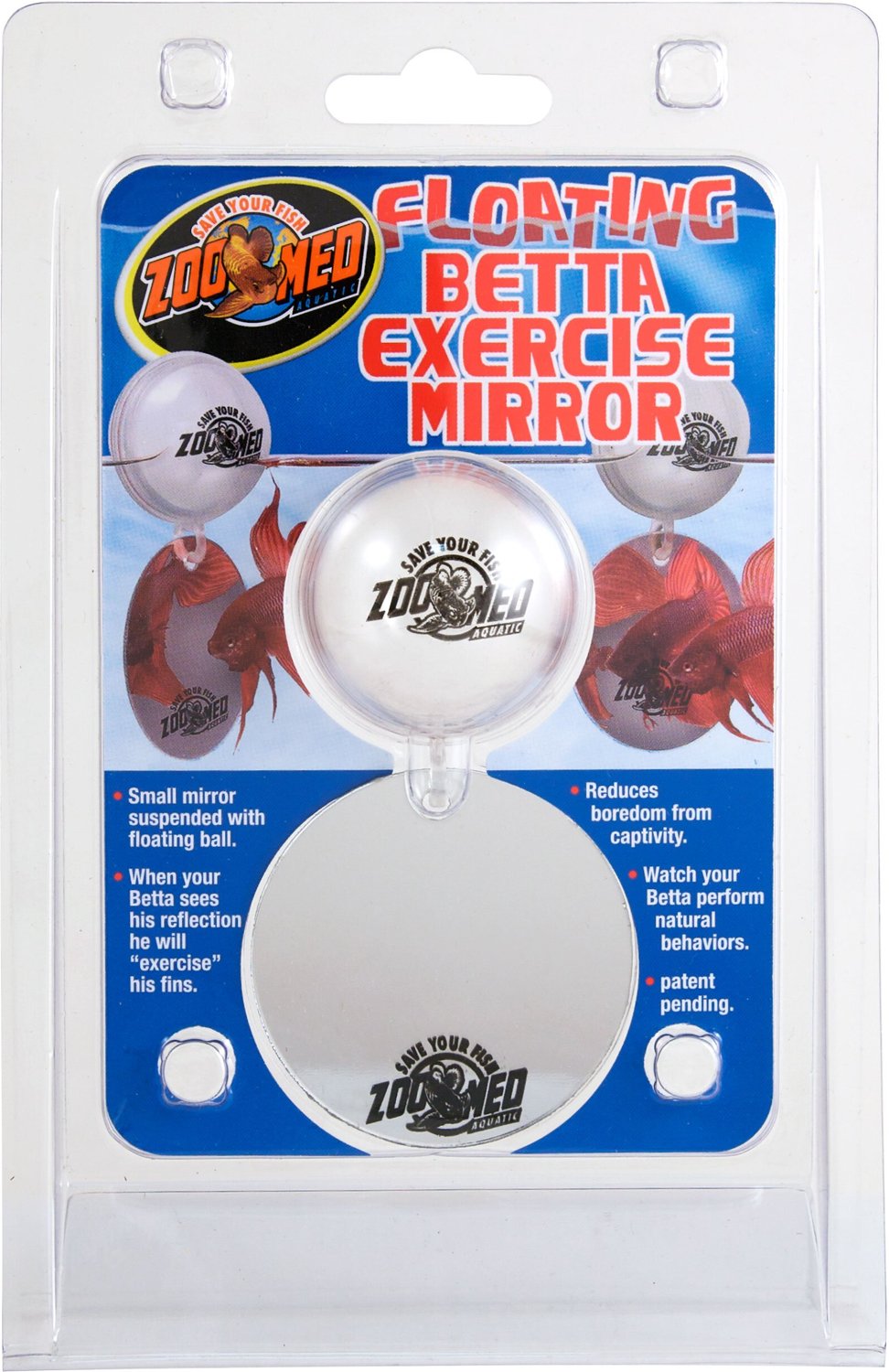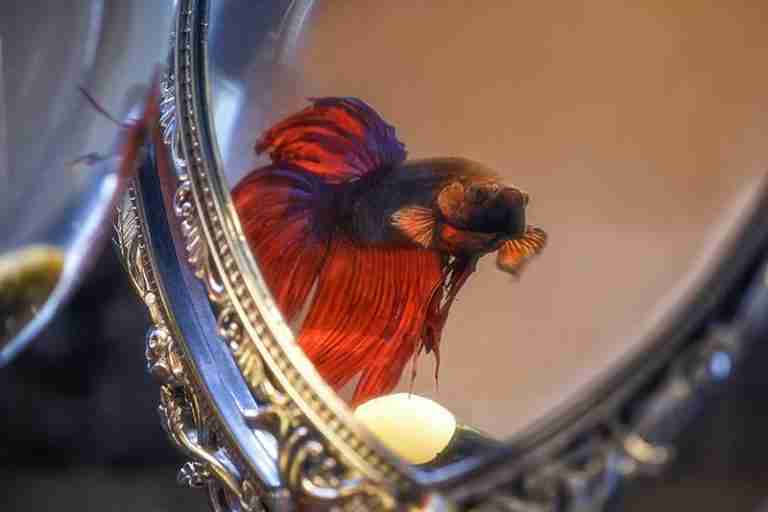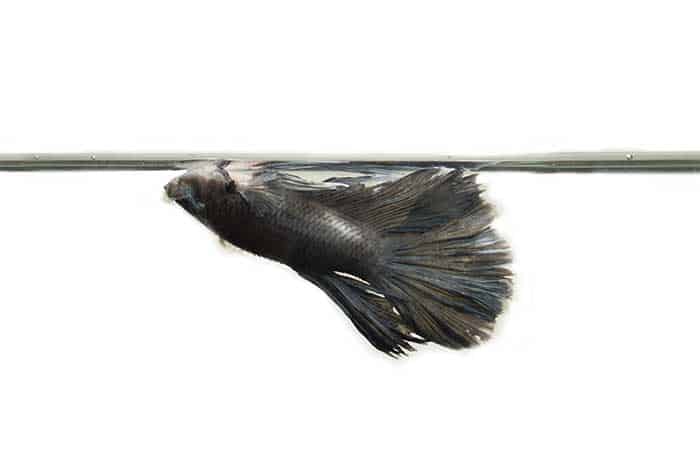Betta Fish Hiding – Common Reasons Why, And What To Do
Although betta fish are often active and curious, there may come a time when your betta suddenly exhibits some hiding behavior, taking refuge in a corner of the tank, in a cave, or you may find your betta fish hiding behind the filter or heater. So why is your betta fish hiding, and what can you do about it?
Betta fish hide for several reasons, such as:
- Betta fish don’t like too much light.
- Your betta’s tank is too small.
- Your betta wants to avoid other tank mates.
- The current in their tank is too strong.
- Your betta may be sick or injured.
- Your betta is depressed.
- There is too much ambient noise.
It is important that you understand why your betta fish is hiding so that you can provide it with the best environment or take other steps to put them at ease.

In this post, we’ll look at some of the most common reasons betta fish hide out in corners of their tank or underneath things and what you can do if your betta is exhibiting this behavior.
Why Does My Betta Fish Hide In The Corners Of The Tank
Bettas typically hide when they are uncomfortable, so your main aim should be to improve the health and happiness of your pet.
In the wild, a betta’s environment provides them with plenty of hiding places. They are voracious hunters, so bettas typically hide amongst plants, often preferring to be hidden rather than out in the open.
If your betta is hiding out in the corners of their tank, you can probably blame its new environment. Your tank setup should consider a betta’s need for hiding spots. If your betta does not have a good hiding place, it will naturally retreat to the edges of the tank and will often sit behind the filter.
1. Too Much Light In The Tank
People often think that bettas enjoy the bright lights you find on tanks with many different kinds of light setups, but bettas actually prefer dimmer light because their natural environment would not have bright, sunny areas.
In the wild, a bettas environment would be heavily planted, providing plenty of naturally dark areas to hide, so if your tank lights are too bright or you leave them on for most of the day and night without providing shaded areas for them to hide, they will find the dimmest corner of their tank and hide there.
2. Not Enough Plants Or Hiding Spots
As I have mentioned above, plants make up a large portion of a wild betta’s natural habitat and provide plenty of natural shade and hiding spots.
Floating plants are a popular choice for a betta tank as they are not too dense and will sit at the water’s surface, blocking some of the harsh light from penetrating.
It doesn’t matter if you use live plants or artificial plants, they will serve the same purpose by giving your betta somewhere to hide other than the corners of your betta tank.

If you choose to use fake plants, you will not get the same benefits as real ones, which increase tank oxygen levels and promote beneficial bacteria growth to keep your tank water balanced. Both real and artificial plants will provide enough natural shade.
Many newer betta owners will keep a fairly bare tank, which is far from the perfect environment for a betta fish. A betta will feel threatened and constantly exposed with nothing to hide behind.
Betta fish will feel safe with plenty of hiding places to choose from and will likely stay out in the open for longer. Ornaments or small caves will provide some hiding spots and give your tank some character.
Setting up your betta tank correctly to start off will provide the best environment to put them at ease and reduce the chance of them needing to hide away.
3. The Water Current In Your Tank Is Too Strong
Wild bettas are used to slow-moving water, so if the filter you are using is too strong for its tank size, the created current will also be too strong and cause your betta to hide away.
If the water current is too strong, bettas tend to seek shelter behind the filter or below the filter intake, where the current is at its weakest. If you find your betta hanging around these areas, you can be pretty confident that your filter flow rate is too strong.
When you purchase a filter, make sure that it is suitable for the size of your tank, or buy an adjustable flow filter with a low setting. Betta fish like some water movement, provided they can easily swim into and play in a slow-moving current. A slower current will also provide your betta with some exercise.
If you cannot reduce the flow rate of your filter, the best option is to raise the outlet or output hose above the water level by an inch or two, keeping the intake beneath the water. This will cause the water to drip down into the tank causing more of a disturbance to the surface water but will reduce the general flow rate.
Raising the filter will also improve the level of dissolved oxygen that enters the water.
4. Too Much Noise
Another reason your betta fish may hide is the noise outside the tank or even inside the tank, especially if you have a noisy filter system. Betta fish are quite sensitive to sounds and can easily be startled by sudden noises.
Sound waves travel quickly through water and are easily amplified. Try to keep ambient noise to a minimum and avoid tapping on the glass, as these may cause your betta to feel uncomfortable.
Try not to put your betta’s tank too close to the television or radio, and keep it away from noisy rooms, such as the kitchen, as these will be constant stressors.
Strangely, some betta fish like certain types of music, which may coax them out from wherever they are hiding if it’s not played too loudly.
Your Betta Tank Is Too Small
If your betta tank is too small, a betta will feel exposed and at risk from threats. A betta’s instinct is to protect itself from predators, and it will need space to run away if necessary. A betta that feels confined with nowhere to run will be under constant stress and want to hide most of the time.

Many people believe that because you may find wild betta fish in tiny puddles and sluggish streams, they can also thrive in tiny tanks. Although betta fish can live in very shallow water, they require space to swim and hide. The puddles and streams they dwell in may be shallow, but they are quite expansive and provide ample territory for several bettas to live peacefully.
I will not talk in-depth about what tank size is best for a betta fish, but ideally, you will want to consider looking at 5 gallons upwards. A 5-gallon tank is generally too small. Instead, a 15-20 gallon tank would be ideal for even a single betta fish.
Your Betta Wants To Avoid Other Tank Mates
If your betta lives with other tank mates, they may occasionally want to isolate themselves. This isn’t just a bettas behavior, it’s something that many fish species do.
When bettas hide, it commonly signifies that they’re feeling stressed or threatened in some way. Many bettas live with tank mates that they don’t get along with, and some of these fish can be real fin nippers which aren’t good news for a betta with long-flowing fins.
Try rearranging your tank layout if you notice your betta hiding underneath decorations or plants. If you’re keeping bettas with other fish, do your research to find the best tank mates that will be the least threatening.
Male and female betta fish can sometimes live together peacefully in the right setting, which is sometimes necessary for them to mate. Have a look at another article I wrote: Can Male And Female Betta Fish Live Together (Tips for success!) if you want to find out more about this.
Under no circumstances should you risk keeping 2 male betta fish in the same tank, as you will just be asking for trouble. Male betta fish are best kept apart, or you will see many bouts of aggression and fin flaring, which is quite normal behavior between male bettas.
You can learn more about betta fighting in this article: Why do betta fish fight?
Betta fish are even known to become aggressive towards their own reflection in the tank glass, and you can witness this behavior by introducing a mirror into the fish tank.
I often use mirrors which are a much better way of providing your betta with some company. A mirror can be introduced for short period before being removed again. If your betta becomes stressed and aggressive at its reflection, it can’t come to much harm.
I have a post titled “Do betta fish like mirrors,” which is an interesting read and explains in a little more detail the benefits of using a mirror in your betta tank.
You May Have A Sick Or Injured Betta
If you have a sick or injured betta, it will naturally feel less able to defend itself from threats and often hide away until it has recovered.
Illness In Betta Fish
Many diseases are difficult to detect, and many are caused by stress, which reduces a betta fish’s immunity to specific germs and allows a bacterial infection to occur.
If you believe an illness is to blame, you should first examine the water parameters in your betta tank. A healthy and balanced tank will help you to keep healthy fish.
The water parameters to check are:
- Ammonia, Nitrate, and Nitrite levels.
- The water pH level.
- Water temperature.
- Test for the presence of chlorine and other chemicals.
Water quality problems are a primary cause of fish disease and can result in bacterial infections or nitrite poisoning. If food and fish waste build up in your aquarium, ammonia levels will rise, causing a sudden spike in nitrate and nitrite levels.
Nitrite poisoning is extremely dangerous, so you must monitor your betta fish closely for signs of stress or illness. You can use a liquid betta test kit from a local fish store or online to test your betta’s water for nitrite poisoning.
It’s always better to prevent an issue rather than cure it after the betta fish has been exposed to the toxins, you should clean your betta tank regularly.
Find the best price for water parameter test strips At Amazon Or Chewy.
Understanding general betta behavior is a good way of knowing whether or not your betta fish is healthy. A betta should be active, constantly exploring their tank and flaring to show their betta colors off to their best effect.
If you notice any unusual behavior from your betta, such as laying on the bottom of the betta tank, shying away from betta fish food, or generally looking like it’s not feeling well, then you probably have a sick or dying betta.
Injury In Betta Fish
Injury can also cause your betta to hide away. If other fish have caused the injury, you must stop further incidents, or your betta will not want to be an active tank member.
If you can see obvious damage to your betta’s scales or fins, the damage has likely been caused by fighting. However, as I have already mentioned above, fin rot is common among betta fish and can look similar. Injury can also progress into fin rot, so a suitable treatment may be necessary.
Your Betta Fish Is Depressed
Betta fish do get depressed, and why wouldn’t they when stuck in a tank away from their natural habitat? All animals have natural instincts which are dulled down in captivity, which can cause a betta to become bored, lonely, and depressed.
Depression can show itself in several ways, such as:
- Hiding away in the tank.
- Staying in one place and not moving.
- Lack of appetite, or your betta stops eating altogether.
- Unusual behavior, such as biting their own fins.
Exercise is a good way to keep your betta interested, and there are many toys that you can either purchase online or even try to make yourself.
A simple betta ball is a very popular toy. It is a simple floating ball, often with different patterns or colors, which will float at the surface. If you find your betta fish is hiding, pop a betta ball in the tank. Once your betta gets used to it, you may find that your betta will spend many hours pushing it around.
A simple ping pong ball will do if you don’t have a betta ball. You can color it in or draw patterns on it to make the ball a little more interesting.
I have also mentioned earlier in this post that betta mirrors are a good form of exercise. The sight of their reflection may initially cause aggression from your betta and lead to gill flaring, but this is natural and will help your betta let go of some pent-up energy.
Unless your betta grows overly attached to the mirror, I would only use it for around 15-20 minutes.
Zoo Med Betta Exercise Mirror
Betta exercise mirrors are an excellent way of bringing your betta out of its shell.
Your betta will probably show aggressive flaring at this imposter in its tank, but flaring is great exercise and helps reduce constipation and other ailments.
Zoo Meds exercise mirrors are pretty inexpensive, considering how much you would use them. The mirror comes attached to a floating ball, so your betta can easily push it around.
As with people, exercise is a great way of beating the blues and getting rid of depression. If you can coax your betta from its hiding spot and create a new routine for them, you may find your betta hides less and will begin to look forward to some playtime.
Conclusion
So as you can see, a betta fish can hide for many reasons, from poor water quality, bullying tank mates, and general depression.
The more you know your betta, the easier it will be to establish the problem. The environment is often the cause, and we have a guide to Setting Up A Betta Tank (The Right Way) if you are interested.
Hopefully, this guide has given you a few things to think about, and I hope it helps you solve your betta hiding problem. Maybe you have gained some insights into better betta care along the way.










